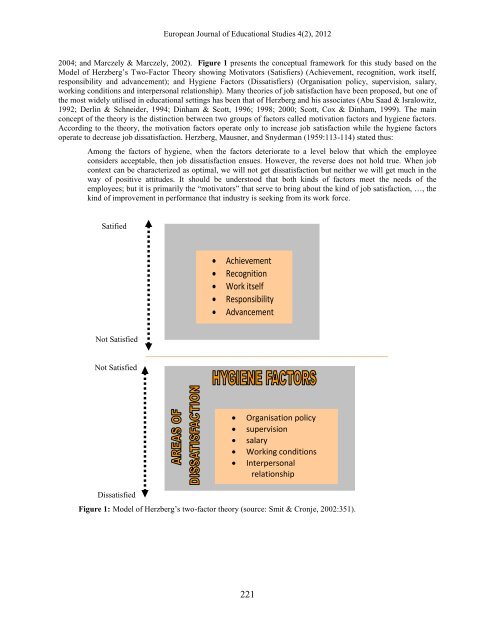the level of the job satisfaction of teachers in botswana pedzani ...
the level of the job satisfaction of teachers in botswana pedzani ...
the level of the job satisfaction of teachers in botswana pedzani ...
Create successful ePaper yourself
Turn your PDF publications into a flip-book with our unique Google optimized e-Paper software.
European Journal <strong>of</strong> Educational Studies 4(2), 2012<br />
2004; and Marczely & Marczely, 2002). Figure 1 presents <strong>the</strong> conceptual framework for this study based on <strong>the</strong><br />
Model <strong>of</strong> Herzberg‘s Two-Factor Theory show<strong>in</strong>g Motivators (Satisfiers) (Achievement, recognition, work itself,<br />
responsibility and advancement); and Hygiene Factors (Dissatisfiers) (Organisation policy, supervision, salary,<br />
work<strong>in</strong>g conditions and <strong>in</strong>terpersonal relationship). Many <strong>the</strong>ories <strong>of</strong> <strong>job</strong> <strong>satisfaction</strong> have been proposed, but one <strong>of</strong><br />
<strong>the</strong> most widely utilised <strong>in</strong> educational sett<strong>in</strong>gs has been that <strong>of</strong> Herzberg and his associates (Abu Saad & Isralowitz,<br />
1992; Derl<strong>in</strong> & Schneider, 1994; D<strong>in</strong>ham & Scott, 1996; 1998; 2000; Scott, Cox & D<strong>in</strong>ham, 1999). The ma<strong>in</strong><br />
concept <strong>of</strong> <strong>the</strong> <strong>the</strong>ory is <strong>the</strong> dist<strong>in</strong>ction between two groups <strong>of</strong> factors called motivation factors and hygiene factors.<br />
Accord<strong>in</strong>g to <strong>the</strong> <strong>the</strong>ory, <strong>the</strong> motivation factors operate only to <strong>in</strong>crease <strong>job</strong> <strong>satisfaction</strong> while <strong>the</strong> hygiene factors<br />
operate to decrease <strong>job</strong> dis<strong>satisfaction</strong>. Herzberg, Mausner, and Snyderman (1959:113-114) stated thus:<br />
Among <strong>the</strong> factors <strong>of</strong> hygiene, when <strong>the</strong> factors deteriorate to a <strong>level</strong> below that which <strong>the</strong> employee<br />
considers acceptable, <strong>the</strong>n <strong>job</strong> dis<strong>satisfaction</strong> ensues. However, <strong>the</strong> reverse does not hold true. When <strong>job</strong><br />
context can be characterized as optimal, we will not get dis<strong>satisfaction</strong> but nei<strong>the</strong>r we will get much <strong>in</strong> <strong>the</strong><br />
way <strong>of</strong> positive attitudes. It should be understood that both k<strong>in</strong>ds <strong>of</strong> factors meet <strong>the</strong> needs <strong>of</strong> <strong>the</strong><br />
employees; but it is primarily <strong>the</strong> ―motivators‖ that serve to br<strong>in</strong>g about <strong>the</strong> k<strong>in</strong>d <strong>of</strong> <strong>job</strong> <strong>satisfaction</strong>, …, <strong>the</strong><br />
k<strong>in</strong>d <strong>of</strong> improvement <strong>in</strong> performance that <strong>in</strong>dustry is seek<strong>in</strong>g from its work force.<br />
Satified<br />
<br />
<br />
<br />
<br />
<br />
Achievement<br />
Recognition<br />
Work itself<br />
Responsibility<br />
Advancement<br />
Not Satisfied<br />
Not Satisfied<br />
____________________________________________________________<br />
<br />
<br />
<br />
<br />
<br />
Organisation policy<br />
supervision<br />
salary<br />
Work<strong>in</strong>g conditions<br />
Interpersonal<br />
relationship<br />
Dissatisfied<br />
Figure 1: Model <strong>of</strong> Herzberg‘s two-factor <strong>the</strong>ory (source: Smit & Cronje, 2002:351).<br />
221

















